Items filtered by date: April 2024
Causes and Symptoms of Athlete's Foot
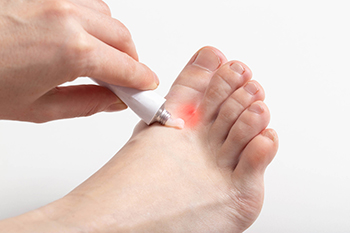
Athlete's foot, known medically as tinea pedis, is a common fungal infection that affects the skin of the feet. It thrives in warm, moist environments, such as locker rooms, swimming pools, and communal showers. This condition is caused by various types of fungi, primarily belonging to the dermatophyte group. Symptoms of athlete's foot include itching, burning, and stinging sensations, frequently between the toes or on the soles of the feet. As the infection progresses, the skin may become red, cracked, and blistered. In severe cases, it can lead to the development of painful ulcers or secondary bacterial infections. Athlete's foot is extremely contagious and can spread through direct contact with infected surfaces or by sharing contaminated items like towels or shoes. Practicing good foot hygiene, wearing breathable footwear, and keeping feet dry can help prevent the occurrence of this bothersome condition. If you have developed this ailment, it is suggested that you visit a podiatrist who will often prescribe medication for relief and healing.
Athlete’s foot is an inconvenient condition that can be easily reduced with the proper treatment. If you have any concerns about your feet and ankles, contact one of our podiatrists from Suncoast Podiatry Associates. Our doctors will treat your foot and ankle needs.
Athlete’s Foot: The Sole Story
Athlete's foot, also known as tinea pedis, can be an extremely contagious foot infection. It is commonly contracted in public changing areas and bathrooms, dormitory style living quarters, around locker rooms and public swimming pools, or anywhere your feet often come into contact with other people.
Solutions to Combat Athlete’s Foot
- Hydrate your feet by using lotion
- Exfoliate
- Buff off nails
- Use of anti-fungal products
- Examine your feet and visit your doctor if any suspicious blisters or cuts develop
Athlete’s foot can cause many irritating symptoms such as dry and flaking skin, itching, and redness. Some more severe symptoms can include bleeding and cracked skin, intense itching and burning, and even pain when walking. In the worst cases, Athlete’s foot can cause blistering as well. Speak to your podiatrist for a better understanding of the different causes of Athlete’s foot, as well as help in determining which treatment options are best for you.
If you have any questions please feel free to contact our office located in Ocala, FL . We offer the newest diagnostic and treatment technologies for all your foot and ankle needs.
Causes of Big Toe Joint Pain
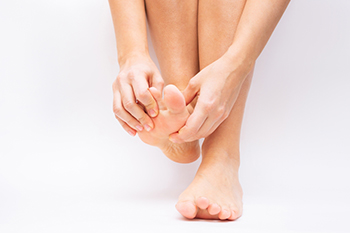
Big toe joint pain can be a nagging and debilitating issue, affecting mobility and daily activities. Understanding the root causes is imperative to finding effective relief and restoring comfort to your feet. One common culprit is osteoarthritis, a degenerative joint disease characterized by the breakdown of cartilage in the joints. When osteoarthritis affects the big toe joint, it can lead to pain, stiffness, and swelling, particularly during movement or weight-bearing activities. Another potential cause is gout, a type of arthritis caused by the buildup of uric acid crystals in the joints, resulting in sudden and intense pain in the big toe joint. Additionally, injuries such as sprains or fractures, as well as conditions like bunions or sesamoiditis, can contribute to big toe joint pain. Identifying the specific cause through a thorough evaluation by a podiatrist is essential for developing an appropriate treatment plan tailored to your needs. If you have big toe pain, it is suggested that you consult a podiatrist who can accurately determine what the cause is, and offer appropriate treatment methods.
Toe pain can disrupt your daily activities. If you have any concerns, contact one of our podiatrists of Suncoast Podiatry Associates. Our doctors can provide the care you need to keep you pain-free and on your feet.
What Causes Toe Pain?
Most severe toe pain is caused due to a sports injury, trauma from dropping something heavy on the toe, or bumping into something rigid. Other problems can develop over time for various reasons.
Toe pain can be caused by one or more ailments. The most common include:
- Trauma
- Sports injury
- Wearing shoes that are too tight
- Arthritis
- Gout
- Corns and calluses
- Hammertoe
- Bunions
- Blisters
- Ingrown toenails
- Sprains
- Fractures (broken bones)
- Dislocations
When to See a Podiatrist
- Severe pain
- Persistent pain that lasts more than a week
- Signs of infection
- Continued swelling
- Pain that prevents walking
Diagnosis
In many cases the cause of toe pain is obvious, but in others, a podiatrist may want to use more advanced methods to determine the problem. These can range from simple visual inspections and sensation tests to X-rays and MRI scans. Prior medical history, family medical history, and any recent physical traumatic events will all be taken into consideration for a proper diagnosis.
Treatment
Treatments for toe pain and injuries vary and may include shoe inserts, padding, taping, medicines, injections, and in some cases, surgery. If you believe that you have broken a toe, please see a podiatrist as soon as possible.
If you have any questions please feel free to contact our office located in Ocala, FL . We offer the newest diagnostic tools and technology to treat your foot and ankle needs.
The Importance of Caring for Elderly Feet
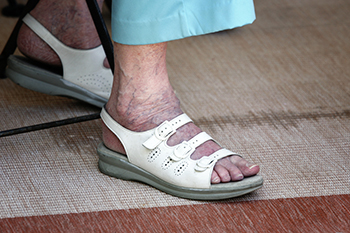
Elderly feet require special attention and care due to the natural aging process and the accumulation of years of wear and tear. As individuals age, the skin becomes thinner and loses elasticity, making it more susceptible to injury and infection. Conditions like arthritis and diabetes, common among the elderly, further compound foot health issues, increasing the risk of complications such as neuropathy, deformities, and slow wound healing. Reduced mobility and circulation also contribute to foot ailments, including swelling, stiffness, and decreased sensation. Neglecting foot health can lead to discomfort, pain, and mobility limitations, significantly impacting quality of life. Regular foot inspections, proper hygiene, and wearing supportive footwear are essential preventative measures. Seeking prompt medical attention for any signs of infection, injury, or discomfort is essential to prevent complications and maintain overall well-being. If you are a senior, or caring for an elderly individual, it is suggested that routine visits are made to a podiatrist where various foot conditions can be treated.
Proper foot care is something many older adults forget to consider. If you have any concerns about your feet and ankles, contact one of our podiatrists from Suncoast Podiatry Associates. Our doctors can provide the care you need to keep you pain-free and on your feet.
The Elderly and Their Feet
As we age we start to notice many changes in our body, but the elder population may not notice them right away. Medical conditions may prevent the elderly to take notice of their foot health right away. Poor vision is a lead contributor to not taking action for the elderly.
Common Conditions
- Neuropathy – can reduce feeling in the feet and can hide many life-threatening medical conditions.
- Reduced flexibility – prevents the ability of proper toenail trimming, and foot cleaning. If left untreated, it may lead to further medical issues.
- Foot sores – amongst the older population can be serious before they are discovered. Some of the problematic conditions they may face are:
- Gouging toenails affecting nearby toe
- Shoes that don’t fit properly
- Pressure sores
- Loss of circulation in legs & feet
- Edema & swelling of feet and ankles
Susceptible Infections
Diabetes and poor circulation can cause general loss of sensitivity over the years, turning a simple cut into a serious issue.
If you have any questions please feel free to contact our office located in Ocala, FL . We offer the newest diagnostic and treatment technologies for all your foot and ankle needs.
Types and Symptoms of Foot Arthritis
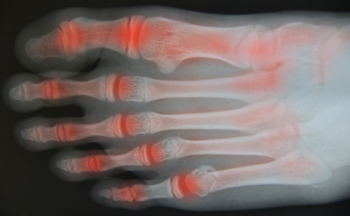
Foot arthritis encompasses various types, each with distinct characteristics and symptoms. Osteoarthritis, the most common form, occurs due to wear and tear on the joints over time, leading to pain, stiffness, and swelling in the affected areas. Rheumatoid arthritis, an autoimmune disorder, results in inflammation of the joints, including those in the foot. This can lead to intense pain, swelling, and deformities. Furthermore, post-traumatic arthritis develops following injuries to the foot, such as fractures or severe sprains, leading to progressive joint degeneration and chronic pain. Regardless of the type, foot arthritis often manifests as discomfort during weight-bearing activities, such as walking or standing, accompanied by reduced mobility and stiffness. Additionally, individuals may experience tenderness, warmth, and joint instability in the affected foot. If you have arthritis that is affecting your feet, it is suggested that you are under the care of a podiatrist who can help you manage this condition.
Arthritis can be a difficult condition to live with. If you are seeking treatment, contact one of our podiatrists from Suncoast Podiatry Associates. Our doctors can provide the care you need to keep you pain-free and on your feet.
Arthritic Foot Care
Arthritis is a term that is commonly used to describe joint pain. The condition itself can occur to anyone of any age, race, or gender, and there are over 100 types of it. Nevertheless, arthritis is more commonly found in women compared to men, and it is also more prevalent in those who are overweight. The causes of arthritis vary depending on which type of arthritis you have. Osteoarthritis for example, is often caused by injury, while rheumatoid arthritis is caused by a misdirected immune system.
Symptoms
- Swelling
- Pain
- Stiffness
- Decreased Range of Motion
Arthritic symptoms range in severity, and they may come and go. Some symptoms stay the same for several years but could potentially get worse with time. Severe cases of arthritis can prevent its sufferers from performing daily activities and make walking difficult.
Risk Factors
- Occupation – Occupations requiring repetitive knee movements have been linked to osteoarthritis
- Obesity – Excess weight can contribute to osteoarthritis development
- Infection – Microbial agents can infect the joints and trigger arthritis
- Joint Injuries – Damage to joints may lead to osteoarthritis
- Age – Risk increases with age
- Gender –Most types are more common in women
- Genetics – Arthritis can be hereditary
If you suspect your arthritis is affecting your feet, it is crucial that you see a podiatrist immediately. Your doctor will be able to address your specific case and help you decide which treatment method is best for you.
If you have any questions, please feel free to contact our office located in Ocala, FL . We offer the newest diagnostic and treatment technologies for all your foot care needs.
Let the Expert Treat Your Ingrown Toenails
The Impact of Obesity on Children's Feet
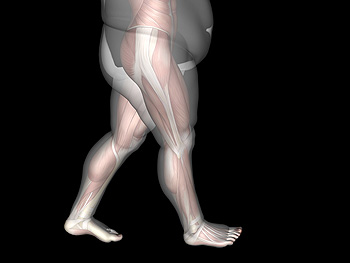
Childhood obesity is a pressing concern affecting millions worldwide, with repercussions extending beyond physical health. Among the many adverse effects, the impact on children's feet is often overlooked but significant. Excessive weight places immense pressure on the feet, leading to a range of orthopedic issues. Flat feet, for instance, are common among obese children, as the arches may collapse under the body's weight. This not only causes discomfort but also affects mobility and posture. Furthermore, obesity increases the risk of developing conditions like plantar fasciitis, where the tissue connecting the heel to the toes becomes inflamed due to strain. Over time, untreated foot problems can escalate, hindering a child's ability to engage in physical activities and leading to long-term health complications. Addressing childhood obesity is essential not only for overall health but also for preventing foot-related issues that can impact a child's quality of life. If your child has excess weight and has developed foot conditions, it is suggested that you consult a podiatrist.
Obesity has become very problematic at this point in time and can have extremely negative effects on the feet. If you’re an obese individual and are concerned about your feet, contact one of our podiatrists from Suncoast Podiatry Associates. Our doctors can provide the care you need to keep you pain-free and on your feet.
Obesity and Your Feet
Since your feet are what support your entire weight when standing, any additional weight can result in pain and swelling. Being overweight is one of the main contributors to foot complications.
Problems & Complications
Extra Weight – Even putting on just a few extra pounds could create serious complications for your feet. As your weight increases, your balance and body will shift, creating new stresses on your feet. This uneven weight distribution can cause pain, even while doing the simplest tasks, such as walking.
Diabetes – People who are overweight are at serious risk of developing type-2 diabetes, which has a drastic impact on the health of your feet. As you get older, your diabetes might worsen, which could lead to loss of feeling in your feet, sores, and bruises. You could also become more prone to various infections.
Plantar fasciitis – Pressure and stress that is placed on muscles, joints, and tendons can trigger plantar fasciitis, which is an inflammation of tissue that forms along the bottom of the foot.
If you have any questions please feel free to contact our office located in Ocala, FL . We offer the newest diagnostic and treatment technologies for all your foot and ankle needs.

